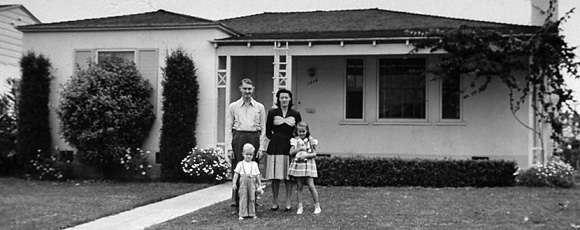
(2 of 4)
The History of a Dream
Dreams of God and of gold (not necessarily in that order) made America possible. The First Charter of Virginia — the 1606 document that authorized the founding of Jamestown — was 3,805 words long. Ninety-eight of them are about carrying religion to "such people as yet live in darkness and miserable ignorance of the true knowledge and worship of God"; 97% of the charter concerns the taking of "all the Lands, Woods, Soil, Grounds, Havens, Ports, Rivers, Mines, Minerals, Marshes, Waters, Fishing, Commodities," as well as orders to "dig, mine, and search for all Manner of Mines of Gold, Silver, and Copper."
Explorers in the 16th and 17th centuries sought riches; religious dissenters came seeking freedom of worship. In 1630 layman John Winthrop wrote a sermon alluding to America as "a city upon a hill," explicitly linking the New World to the Sermon on the Mount. (Always shrewd about visuals, Ronald Reagan would add the adjective shining to the image several centuries later.)
We have been cognitively dissonant from the beginning. European settlers set about driving the Native American populations to the west, setting in motion a tragic chain of events that culminated in the Trail of Tears in the middle of the 19th century. In 1619, meanwhile, a Dutch man-of-war brought African slaves to Virginia. And so while white settlers built and dreamed, people of color were subjugated and exploited by a rising nation that prided itself on the expansion of liberty.
The British Americans who broke with England to form a new nation in the 1770s found slavery inconvenient but not insurmountable as they codified the dream that had fueled the discovery and early years of the New World. By founding the U.S. on the idea that a man's natural rights included "life, liberty and the pursuit of happiness," Jefferson, writing in the Philadelphia summer of 1776, put hope at the center of the national drama. The pursuit of happiness is a phrase philosophically rooted in the thinking of the Scottish Enlightenment, but it was only in America that the notion moved from theory to broad-based reality.
This was partly because there was so much room to run in the New World. The vastness of the continent, the seemingly endless frontier, the staggering natural resources: these, combined with a formidable American work ethic, made the pursuit of happiness more than a full-time proposition. It was a consuming one, all-enveloping. Suddenly birth mattered less than it ever had before. Entitled aristocracies crumbled before natural ones. If you were white and willing to work, you stood a chance of transcending the circumstances of your father and his father's father. By 1832, the height of the Age of Jackson, even Henry Clay, who thought Old Hickory an American Bonaparte, could declare, "We are a nation of self-made men."
The next year, President Jackson appointed one such man to be postmaster of Salem, Ill. Though a Whig, Abraham Lincoln was happy to accept. His rise from frontier origins became both fable and staple in the American Dream narrative. Lincoln understood the power of his story in real time, for he knew that he embodied the Jeffersonian hopes of Americans everywhere. "I happen temporarily to occupy this big White House," Lincoln said the year before he died. "I am a living witness that any one of your children may look to come here as my father's child has."
The Dream is about liberty and prosperity and stability, but it is also about escape and reinvention. Mark Twain understood this. The Adventures of Huckleberry Finn doesn't flinch from the racism and greed of American life. If there is any redemption to be found, it comes from small moments of communion, of humanity. The novel concludes with the enslaved Jim's being granted his freedom and Huck's deciding "to light out for the Territory, ahead of the rest" — an enduring American impulse and an essential element of the American Dream.
The myth of the West was the myth of the nation: that all of us could light out for the Territory and build new, prosperous lives. The allure of the belief in the individual's capacity to make his way — to cross oceans or mountains — only grew stronger as America grew older. Our center of political gravity has always been in motion from east to west (and, to a real extent, from north to south). Though the Census of 1890 declared that the frontier was no more, the idea of packing up and moving on to better things has never faded.